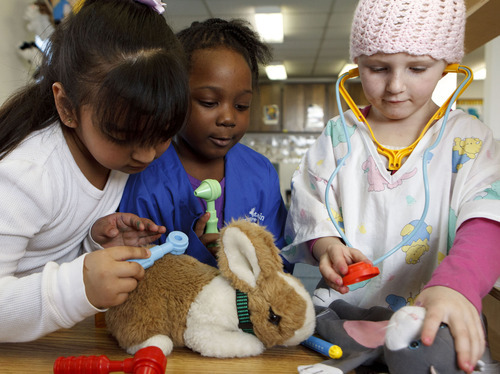This is an archived article that was published on sltrib.com in 2012, and information in the article may be outdated. It is provided only for personal research purposes and may not be reprinted.
For the first time ever, most U.S. babies last year were racial or ethnic minorities. In Utah, only about a quarter were — although that percentage is escalating.
New estimates released Thursday by the U.S. Census Bureau said 50.4 percent of Americans younger than age 1 were minorities in 2011.
That is up from 49.5 percent reported a year earlier, as counted by the 2010 census.
In Utah, the bureau estimated that 28.7 percent of babies were minorities. That was up from 25.2 percent in 2010.
University of Utah research economist Pam Perlich said immigration from abroad to Utah in recent decades has fueled rapid growth in that percentage from an era just a few decades ago when almost all Utahns, young and old, were white and non-Hispanic.
She called the growth of minorities among Utah's youth "the leading edge of the 'majority-minority' generation. Once the old white baby boom generation fades away, that's who's going to take our place."
Earlier census data showed that minorities are already the majority among youth under age 18 in some smaller geographic areas in Utah, such as western Salt Lake City, West Valley City, South Salt Lake and Ogden. Perlich says it is a trend that is expanding statewide — as it has throughout the nation.
In fact, the census said Thursday that 49.7 percent of Americans younger than age 5 are minorities, up from 49 percent in 2010. In Utah, Perlich said schools report that children speak 129 different languages at home, and percentages of minorities are growing almost everywhere.
"A lot of larger metro areas don't have that much cultural and linguistic diversity. It is a treasure in our own communities as we try to connect to the outside world in an increasingly global economy," Perlich said.
While the majority of babies in Utah are still white and non-Hispanic, Perlich said that has been changing because of a 25-year surge of immigration that lasted until the recession hit in 2007.
"If Utah continues to be what it has been over the last 25 years, which is a net-immigration center … then we will continue to trend toward the nation," she said.
The new data show that Latinos are the largest minority group by far in Utah. That population grew by 4 percent to 372,912 in 2011. Utah's Hispanic population grew from 12.97 percent in 2010 to 13.24 percent in 2011.
Utah's next largest minority group is Asians, with a 2011 population of 85,240, or 3 percent of the state's population.
Most immigrants in recent decades were young, Perlich said, so they tended to have children here and help increase the percentage of minorities among Utah's youth.
Also, Utah's universities attract young adults to the state from abroad, she said. "When you combine that with the Mormon culture … we have a lot of children."
The new data released Thursday backed up that assertion. Utah in 2011 once again had the lowest median age in the nation: 29.5 years of age, which was up a few ticks from 29.2 years in 2010.
Perlich said Utah is slowly trending toward the nation as residents tend to marry a bit older and have fewer children, which is raising the state's average age over time.
Nationally, the median age of Americans in 2011 was 37.3, up from 37.2 in 2010.
Maine had the oldest median age of any state: 43.2 years old, or 13.5 years older than in Utah.
Utah also had the highest percentage of its total population that is younger than age 5: 9.3 percent. On the other end of the spectrum, Florida has the highest percentage of its population that is age 65 or older: 17.6 percent.
The new estimates from the Census Bureau on Thursday were for age and minority data from its annual American Community Survey.
It earlier released overall population estimates for states, counties and metropolitan areas. —
U.S. babies now 'majority-minority,' and Utah heading that direction
In 2011, 50.4 percent of Americans under age 1 were minorities — the first time that population reached a majority.
In Utah, 28.7 percent of babies were minorities. But that was up from 25.2 percent in 2010 — and the percentage has been escalating in recent years.



